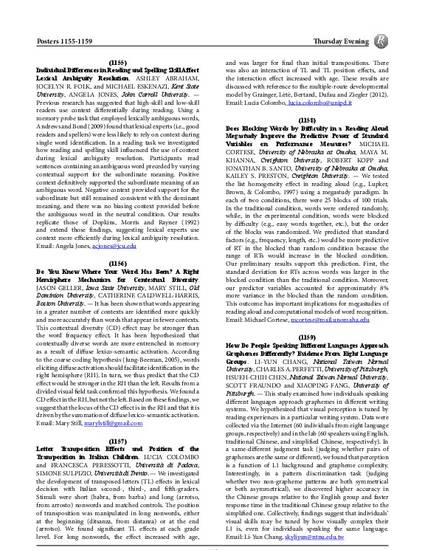
Article
Does Blocking Words by Difficulty in a Reading Aloud Megastudy Improve the Predictive Power of Standard Variables on Performance Measures?
Proceedings of the 56th Annual Meeting of the Psychonomic Society
(2015)
Abstract
We tested the list homogeneity effect in reading aloud (e.g., Lupker, Brown, & Colombo, 1997) using a megastudy paradigm. In each of two conditions, there were 25 blocks of 100 trials. In the traditional condition, words were ordered randomly, while, in the experimental condition, words were blocked by difficulty (e.g., easy words together, etc.), but the order of the blocks was randomized. We predicted that standard factors (e.g., frequency, length, etc.) would be more predictive of RT in the blocked than random condition because the range of RTs would increase in the blocked condition. Our preliminary results support this prediction. First, the standard deviation for RTs across words was larger in the blocked condition than the traditional condition. Moreover, our predictor variables accounted for approximately 8% more variance in the blocked than the random condition. This outcome has important implications for megastudies of reading aloud and computational models of word recognition.
Disciplines
Publication Date
2015
Citation Information
Jonathan Bruce Santo. "Does Blocking Words by Difficulty in a Reading Aloud Megastudy Improve the Predictive Power of Standard Variables on Performance Measures?" Proceedings of the 56th Annual Meeting of the Psychonomic Society (2015) Available at: http://works.bepress.com/jonathan_santo/32/
